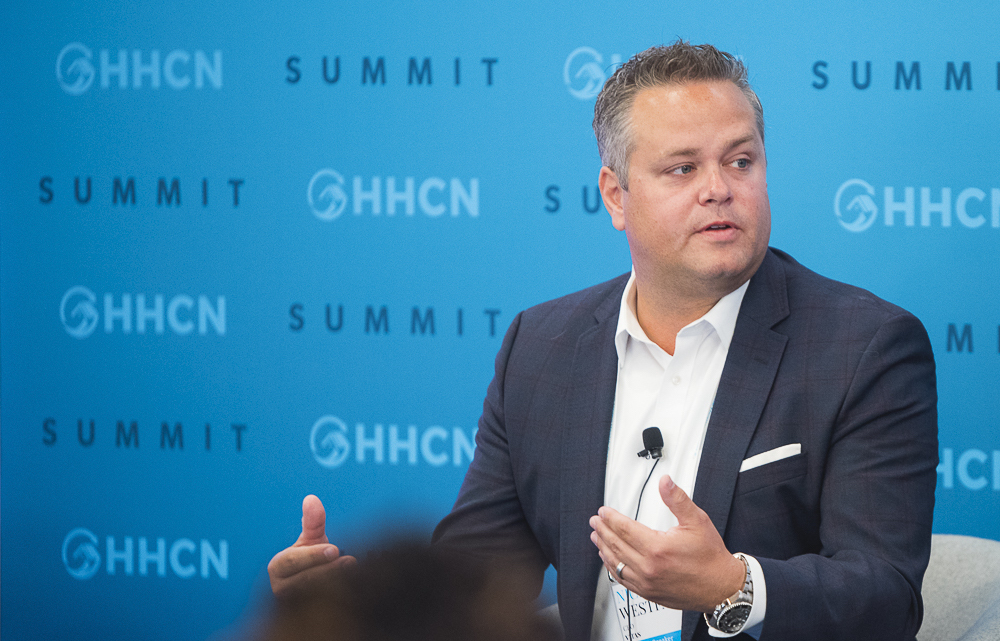Chemed Corp. (NYSE: CHE) subsidiary VITAS Healthcare is banking on improved recruitment and retention to spur upward movement on patient census, admissions and length of stay.
The company is leveraging two interventions implemented last year to build forward momentum, its Community Access Initiative and its recruitment and retention bonus program, according to VITAS President and CEO Nick Westfall.
“Overall, I’m very pleased with the execution of the entire VITAS team regarding how we continue to serve our communities, as well as our renewed focus on recruiting and retention of our workforce,” Westfall said in a Q4 earnings call. “To recap, we have now generated two quarters of sequential growth in licensed health care workers, sequential growth and admissions, as well as [average daily census]. We’ve developed what I believe is a very sustainable path to building back our clinical capacity and patient base to pre-pandemic levels.”
The bonus program included a one-time retention payment that ranged from $2,000 to $15,000 per employee for nurses, nurse managers, home health aides and social workers. Since its implementation in July 2022, VITAS has bolstered its ranks with 275 newly hired licensed clinicians, including 103 during Q4, the company reported.
The majority of these hires were nurses, Westfall indicated.
The company expects the program to bring in roughly 25 new health care workers each month during 2023 at an estimated cost of $40 million, which VITAS hopes to offset with increased volume as staffing gains drive up capacity.
“We want to be able to add clinical capacity to absorb the demand we see, and we’re still ramping up to that,” Westfall said. “The bottom line is, as long as we can continue to improve our retention, improve our hiring, resulting in net growth to have clinical capacity, then we feel really good about the other operating metrics.”
For some of those other metrics, results were mixed for both Q4 and full-year 2022.
Admission rates, for instance, varied depending on the referral source. VITAS saw nursing home admissions rise 9.4% in Q4, along with a 2.7% jump from assisted living facilities. But hospital-directed admissions declined 11.3% and home-based admissions also dipped 7.5%.
Overall, Q4 admissions dropped 8.7% from the prior year’s period, but rose 1.1% from Q3 2022.
Average length of stay is another example. VITAS reached 103.9 days in the fourth quarter, down from 106.2 sequentially, but up from 97.9 year over year. Westfall attributed the year-to-year gains to the company’s Community Access Initiative.
VITAS launched the initiative in an effort to improve timely access to hospice care. It focuses on educating health care providers throughout the continuum to identify patients who are eligible for hospice earlier in their disease process.
“What we were seeing through the pandemic, is such a focus on the hospital that really led to poor access, poor utilization for those that were in the community and needed hospice services,” VITAS Chief Medical Officer Joseph Shega recently told Hospice News. “So we worked really hard to retool all of our education to really make sure they represented the stories of community-dwelling older adults who become hospice eligible, so that we can try to see them the same day, continue to build trust, so that they will feel more comfortable transitioning to hospice.”
Revenues dipped to $308 million during Q4, down 2.5% drop from the prior year’s quarter. The decline resulted from the reinstated 2% Medicare sequestration, a 2.8% reduction in total days of care and a geographically-weighted average Medicare reimbursement rate increase of approximately 3.2% across its markets.
The reistatement of Medicare sequestration represented a significant dent in revenue throughout last year, according to Chemed President and CEO Kevin McNamara.
“Our 2022 headwinds included Medicare reimplementing sequestration, resulting in a raw revenue reduction of approximately $15 million,” McNamara said in the call. “Our 2022 results were excellent given operating headwinds that developed and became more difficult as the year progressed.”



